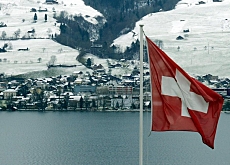Swiss encounter taxing talks in Brussels

Positions have hardened between Switzerland and the European Union over advantageous corporate tax rates granted by a number of Swiss cantons.
The EU Commission made it clear that it would not tolerate such practices in talks on Thursday with Michael Ambühl, State Secretary in the Swiss foreign ministry.
After a meeting in Brussels with Eneko Landaburu, director general of the commission’s external relations, Ambühl said the EU had “expressed its concern”.
Landaburu from Spain appeared less diplomatic in an interview with French-language Swiss radio.
“It’s a political problem when we see practices which lead to very pronounced tax evasion and which penalise our member states.”
France and Germany are strong supporters of this view but the majority of EU members have not yet made their views known.
Unfair?
The tax issue arose in September in a letter sent by the commission questioning whether the central Swiss cantons of Zug and Schwyz granted unfair tax advantages to foreign firms.
Canton Obwalden has since joined their ranks by introducing at the beginning of the year similar tax breaks to attract companies and wealthy people.
Ambühl reaffirmed the Swiss position that cantonal tax advantages granted to some companies do not violate the 1972 free trade agreement signed between Brussels and Bern, which covers trade in a certain number of goods.
Switzerland, which is not a member of the EU, is to give Brussels a more detailed report on its views in the middle of this month.
“It’s therefore a legal question,” Ambühl told Swiss journalists in the Belgian capital.
He added that there was no talk of the issue having ramifications for bilateral relations.
On hold
In a related issue, the process of ratification of the second set of bilateral accords between the EU and Switzerland and the extension of the free movement of people to the ten new EU members remains on hold.
The delay has been caused by EU internal bickering over distribution of the planned Swiss contribution of SFr1 billion ($775 million) to the EU cohesion fund.
The EU wants a binding agreement with the Swiss over their contribution, while Bern only wants a memorandum of understanding.
The Swiss also want their contribution to go only to the ten new EU member states, but Greece, Spain and Portugal want a share of the funds.
swissinfo with agencies
The free trade agreement between Switzerland and the then European Economic Community of 1972 is one of the fundamental pillars of economic relations between Bern and Brussels.
Adopted in December 1972, it was a political by-product of the move by Britain and Denmark from the small European Free Trade Association to the large customs union of the EEC.
The scope of the accord covers only industrial goods.
The issue concerns whether advantageous Swiss cantonal tax rates for companies violate the 1972 free trade agreement signed between Bern and Brussels.
It was raised in a letter from the EU Commission in September questioning the tax practices in the central Swiss cantons of Zug and Schwyz.
Switzerland has always said that tax competition among its 26 cantons is healthy and attracts foreign investors.
Low taxes have helped some cantons, in particular Zug and Schwyz, to attract new investment.
The Organisation for Economic Cooperation and Development in Paris considers such practices “unharmful”.

In compliance with the JTI standards
More: SWI swissinfo.ch certified by the Journalism Trust Initiative











You can find an overview of ongoing debates with our journalists here . Please join us!
If you want to start a conversation about a topic raised in this article or want to report factual errors, email us at english@swissinfo.ch.